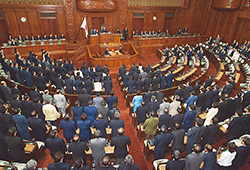
Legislation to enhance the legal framework for peace and security was approved by a majority in the plenary session of the House of Representatives on July 16, with most of the votes in favor coming from the LDP and Komeito. The bills acknowledge the significant changes that have taken place in the security environment surrounding Japan and will enable Japan to respond seamlessly to any circumstances. During the deliberations, Prime Minister Shinzo Abe emphasized political responsibility to protect the lives and peaceful livelihoods of the Japanese people, and the need for this legislation to do so. The bill was sent to the House of Councillors on the same day. The LDP will continue to approach the legislative deliberations in a careful and forthright manner.
The relevant legislation submitted by the government consisted of two bills: the new "International Peace Support Law" and the "Bill to Enhance the Legal Framework for Peace and Security," which is an umbrella legislation for 10 bills, including one to amend the Self-Defense Forces Act. The legislation allows limited exercise of the right of collective self-defense, expands the scope of permitted UN Peacekeeping Operations (PKO) among other international contributions, and enables quick response to security issues on outlying islands.
The House of Representatives' special committee on security legislation began studying the bill on May 26, and by July 15 had spent a total of 116 hours in deliberation, culminating in a plenary question and answer session. During the process, a wide range of perspectives were heard on the "Three New Conditions," which are strict rules on the exercise of force, and on the risks to the Self-Defense Forces, among other issues.
Prime Minister Abe emphasized the need for the security legislation, saying, "There have been significant changes in international circumstances. We cannot provide for our defense entirely on our own." He went on to explain, "[This legislation] will enable us to respond seamlessly to all circumstances, from gray zones to exercise of the right of collective self-defense."
Standing in support of the legislation, Jun Matsumoto, member of the House of Representatives, said at the plenary session on July 16, "Some have said that allowing limited exercise of the right of collective self-defense is 'unconstitutional,' but this criticism is completely unjustified," and "The legislation for peace and security is about more than just exercise of the right of collective self-defense."
He explained that the legislation is constitutional under Article 9 of the current Constitution, and that contributing to world peace and safety by amending the PKO Act would help to vouchsafe Japanese prosperity.
He also noted that the bill submitted by Japan Innovation Party and other opposition parties near the end of the deliberations was inadequate and ineffective in providing a seamless response.
The Democratic Party of Japan (DPJ) and other opposition parties walked out of the Diet when the bill submitted by the government was adopted after the debates, claiming that it was too early, and protested during the adoption in a manner similar to their protest at the special committee on July 15.
The Party and other members of the ruling coalition moved for adoption, arguing that "all of the major arguments have been covered" (Mr. Matsumoto, member of the House of Representatives), and noted that the debate on the security legislation was the longest among security-related bills since the PKO Act.










